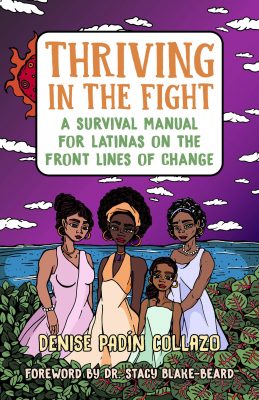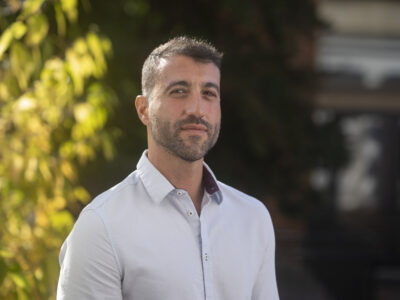
Detalle de portada del libro «Florecer en la lucha: Manual de supervivencia para latinas en la primera línea del cambio».
La activista y autora Denise Padín Collazo, de ascendencia puertorriqueña, ha publicado su libro «Florecer en la lucha: Manual de supervivencia para las latinas en la primera línea del cambio». Tras 25 años de activismo por el cambio de la política económica en Estados Unidos en la «lucha por la justicia racial, política y económica» en la organización religiosa Fe en Acción (Faith in Action), Padín Collazo apoya el liderazgo de las mujeres de color a través de la tutoría y la escritura, especialmente porque muchas abandonan el activismo por agotamiento.
Conversé con ella a través de Zoom para hablar más de su libro. La entrevista se ha editado por razones de brevidad y para que se entienda mejor.
Melissa Vida (MV): Dices que «tenemos que hacer lo que tenemos que hacer para florecer, no solo para sobrevivir». ¿Qué quieres decir con esto?
Denise Padín Collazo (DPC): My experience over the years as a social justice leader is that there have been many times where I really just put my head down and get the work done. You would «stay in the fight» for racial, economic, and political justice or you might be winning a victory, but you're just exhausted. After surviving, you are surrendering, which is the step right before leaving. And surrendering is that place where you've lost the joy, the energy, the creativity. You're doing the work, you're bearing a heavy burden, but you're not showing up as the most brilliant, most effective, most badass version of you that you could.
Denise Padín Collazo (DPC): Mi experiencia a lo largo de los años como líder de la justicia social es que ha habido muchas veces en que solo he bajado la cabeza y he hecho el trabajo. Te «quedas en la lucha» por la justicia racial, económica y política o puede que consigas una victoria, pero estás agotada. Después de sobrevivir, te estás rindiendo, que es el paso justo antes de salir. Y rendirse es ese lugar donde has perdido la alegría, la energía, la creatividad. Estás haciendo el trabajo, estás soportando una pesada carga, pero no te estás mostrando como la versión más brillante, más efectiva, más impresionante de ti.
MV: ¿Cuál es el ingrediente secreto para florecer, entonces?
DPC: There are three keys. I think we need to lead into our vision when we see something in our minds that does not exist yet. Sometimes we find ourselves implementing someone else's vision and that's not where we're at our best. Then, it is to live into your fullest self and not shrinking down in the corner of the room and waiting for answers and permission to come from others. My inspiration for this is how, as Latinas, or people from Latin American countries or Caribbean culture, there's just a way of being when we're all together, we're just «more.» We're bigger, we're louder, we're happier. And the third key is to remind ourselves of the love for our people, love for the work of change, love for our own self, which is enough to help propel us past all the negatives like the messages we've been taught as young girls as to the way women are supposed to be in the world.
DPC: Hay tres claves. Creo que tenemos que llevar nuestra visión cuando vemos algo en nuestra mente que aún no existe. A veces nos encontramos utilizando la visión de otra persona y ahí es donde no estamos en nuestro mejor momento. Entonces, se trata de vivir en tu máximo esplendor, no encogerte en un rincón ni esperar que las respuestas y el permiso vengan de otros. Mi inspiración para esto es como, como latina, o personas de países latinoamericanos o de la cultura caribeña, hay una forma de ser cuando estamos todos juntos, somos simplemente «más». Somos más grandes, más ruidosos y más felices. Y la tercera clave es recordarnos el amor por nuestra gente, el amor por la labor de cambio, el amor por nosotras, que es suficiente para ayudarnos a superar todos los aspectos negativos, como los mensajes que nos han enseñado de jóvenes sobre cómo que se supone que las mujeres deben estar en el mundo.

Foto cortesía de Denise Padín Collazo.
MV: ¿Qué es lo contrario de encogerse?
DPC: As a Latina, I was brought up to serve humbly from behind the scenes and never have any expectation of recognition—no rewards, none of that. I've had to get up my courage and get courage from my sisters to help me lead from the front. That's not the place I feel the most comfortable leading from, but since there are so few of us Latinas in leadership, we don't have a choice. You don't have to do it in the egotistical way that was modeled for us before, we can lead as a collective. Our people whom we are working with need for us to be at the front. And that doesn't mean we have to work more. Sometimes it means we have to work less so we have time to breathe, rest, get sunshine, refresh our own bodies because we spend so much time pouring out.
DPC: Como latina, fui educada para servir humildemente entre bastidores y no esperar nunca ningún reconocimiento, ninguna recompensa, nada de eso. He tenido que armarme de valor y conseguir que mis hermanas me ayuden a liderar desde el frente. Ese no es el lugar desde el que siento más cómodo el liderazgo, pero como somos tan pocas las latinas en el liderazgo, no tenemos otra opción. No hay que hacerlo de la manera egoísta que nos modelaron antes, podemos liderar como colectivo. La gente con quien trabajamos necesita que estemos al frente. Y eso no significa que tengamos que trabajar más. A veces significa que tenemos que trabajar menos para tener tiempo de respirar, descansar, tomar el sol, refrescar nuestro cuerpo porque pasamos mucho tiempo sirviendo.
MV: Esto me lleva a mi siguiente pregunta: ¿qué es la «cultura de la emergencia?
DPC: In the book, I lay out a number of symptoms of white supremacy that exist in organizations. One of those is the culture of emergency. In many of the places I work with, there's just this grind that never stops. We work for racial, political, and economic transformation, and that is not easy work, and it really never stops. It's very hard as an advocate to take a breath and stop. So some things are urgent, like earthquakes, hurricanes, shootings. But some things aren't. I want us to notice it and push against it. For example, time is measured differently across the world. And here in the U.S., you might do a 30-minute phone call with someone and that's just it. But we cannot be our full selves in half an hour. So I've learned to not think that way and to leave myself open for the magic that happens when you take more time to do something, or to be with people and listen to them.
DPC: En el libro, expongo una serie de síntomas de supremacía blanca que existen en las organizaciones. Uno es la cultura de la emergencia. En muchos de los sitios con los que trabajo, hay una rutina que nunca se detiene. Trabajamos por la transformación racial, política y económica, no es una labor sencilla, y realmente nunca se detiene. Como defensora, es muy difícil tomarse un respiro y parar. Así que algunas cosas son urgentes como los terremotos, los huracanes, los tiroteos. Pero otras cosas no lo son. Quiero que nos demos cuenta y presionemos contra esto. Por ejemplo, el tiempo se mide de forma diferente en todo el mundo. Aquí en Estados Unidos puedes tener una llamada de 30 minutos con alguien y eso es todo. Pero no podemos ser nosotros mismos en media hora. Así que he aprendido a no pensar así y a dejarme llevar por la magia que se produce cuando tomas más tiempo para hacer algo, o para estar con la gente y escucharla.
MV: Dedicaste un capítulo entero a denunciar la discriminación contra los negros. ¿Por qué?
DPC: 2020 was a year where we were all challenged by the young, brilliant, amazing leaders of the Black Lives Matter movement, who have been creating a moment all over the world which is making us have to ask ourselves: how is our silence being complicit to the system as it is? I've watched as conversations happen, at least in the U.S., and it ends up being a black or white construct, and Latinos lean back in spaces where race is discussed. If you talk to a [non-black] Latino person and you ask them if they have ever noticed anti-blackness in their own community, some would say, «Yes, but it's all in good fun ….» It's not good. It's about the saying in Latin America mejorar la raza («improving the race») that is about making the race more white. It's about your tía (aunt) saying, «Don't marry this person because he's darker than you.»
As Latinas, we have this opportunity to build really good relationships with our Afro-Latina sisters and our sisters who identify as Black or from African descent. What would it look like if we have real conversations among the Latino community about anti-Blackness and start to really challenge it? It's everywhere in our culture. It's not enough for me to be a fighter for racial justice, I gotta work on our people—go talk to your tíos (uncles) and cousins.
DPC: En 2020 a todos nos desafiaron los jóvenes, brillantes y fantásticos líderes del Movimiento Las Vidas Negras Importan, que han estado creando impulso en todo el mundo que nos hace tener que preguntarnos: ¿cómo nuestro silencio está siendo cómplice del sistema tal y como es? He observado cómo las conversaciones, al menos en Estados Unidos, acaban siendo una construcción de blanco o negro, y los latinos se echan atrás en los espacios donde se discute la raza. Si hablas con un latino [no negro] y le preguntas si ha notado alguna vez alguna discriminación en su propia comunidad, algunos dirán: «Si, pero es todo muy divertido…». No es bueno. Se trata del dicho en América Latina «mejorar la raza» que consiste en hacer la raza más blanca. Se trata de que tu tía diga: «No te cases con esta persona, es más negra que tú».
Como latinas, tenemos esta oportunidad de entablar muy buenas relaciones con nuestras hermanas afrolatinas y con las que se identifican como negras o afrodescendientes. ¿Cómo sería si tuviéramos conversaciones reales entre la comunidad latina sobre la discriminación contra los negros y empezáramos a desafiarla realmente? Está por todas partes en nuestra cultura. No me basta con ser una luchadora por la justicia racial. Voy a trabajar con nuestra gente, vayan a hablar con sus tíos y primos.
MV: Hemos hablados de los «latinos», pero ¿no son todos diferentes? ¿Cuál es el nexo común? 
DPC: In the U.S., anyone who comes as being of Latin American descent is put into one category. But the fact is, we don't all speak the same language, we don't eat the same food, we don't all look the same. There is so much diversity. But the one thing that links us all together is a shared history of oppression, colonization and extraction of natural resources that is continuing to happen today. We have been taught by the church and violent systems like slavery, and sometimes extermination, to believe that whiteness is the right thing. Some Latinos who are in the middle, between white and black, sometimes get confused. The goal is to really understand that we are all being oppressed. Our liberation, including white folks, is achieved through Black liberation. If we can't really understand that, we are only going to see part of the picture.
DPC: En Estados Unidos, a todo el que viene como descendiente de latinoamericanos se le pone en una categoría. Sin embargo, el hecho es que no todos hablamos el mismo idioma, no comemos los mismos alimentos, no tenemos el mismo aspecto. Hay mucha diversidad. El nexo que nos une a todos es una historia compartida de opresión, colonización y extracción de recursos naturales que sigue ocurriendo hoy en día. La iglesia y sistemas violentos como la esclavitud, y a veces el exterminio, nos han enseñado a creer que «blanco es mejor». Algunos latinos que están al medio, entre blanco y negro, a veces se confunden. El objetivo es entender realmente que a todos nos están oprimiendo. Nuestra liberación, incluso la de los blancos, pasa por la liberación de los negros. Si no podemos entender realmente eso solo vamos a ver una parte del cuadro.
MV: ¿Cómo ves el futuro del activismo social?
DPC: I'd love to see a future in which women's leadership is centered, that the idea of leading «with» and not «over» becomes the norm and not the exception. We have enough in this world. We have enough money, water, fresh air. There is enough. We just have to center the attitude of love and leadership that is about everyone and not some people. And I'm not saying that women are perfect, but I have a tremendous amount of confidence in our leadership. If there's that dream that you have in your head and you haven't seen it yet? Go get it. It's yours to get.
DPC: Me encantaría ver un futuro en el que el liderazgo de las mujeres esté centrado, que la idea de liderar «con» y no «sobre» se convierta en la norma y no en la excepción. Tenemos suficiente en este mundo. Tenemos suficiente dinero, agua y aire fresco. Hay suficiente. Solo tenemos que centrar la actitud de amor y liderazgo que tiene que ver con todos y no con algunos. Y no digo que las mujeres sean perfectas, pero tengo una enorme confianza en nuestro liderazgo. ¿Si hay ese sueño que tienes en la cabeza y aún no lo has visto? Anda y búscalo. Está ahí para que lo tomes.






